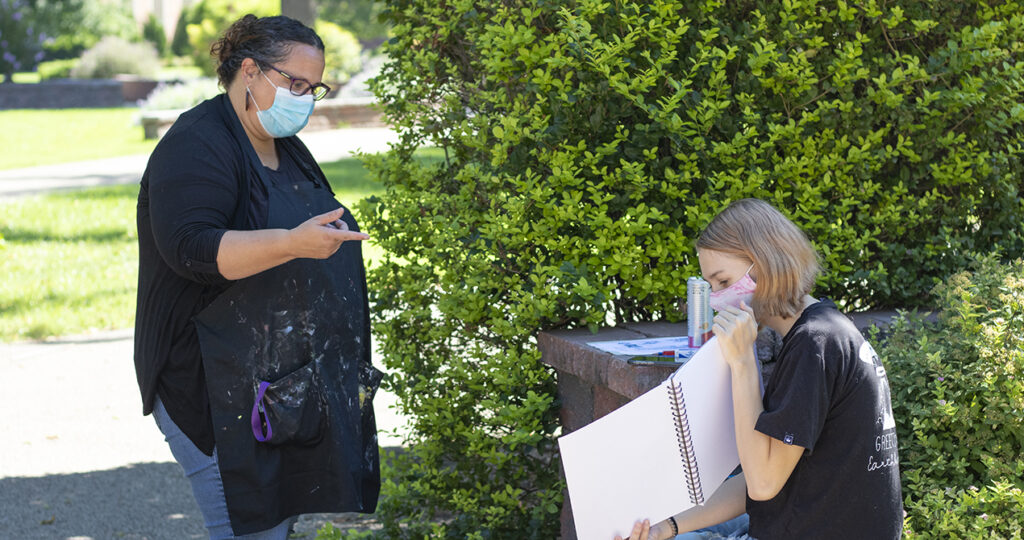Editor’s Note: This is the second in a series of blogs targeted to the prospective KWU student.
Part One: Why Salina?, Feb. 12, 2021
The question “What are your plans after you graduate?” was the bane of my high school existence. The impending weight of adulthood was heavy enough, but most days it felt like everyone expected me to have a concrete path set out and ready to walk on. I didn’t have that, and I grew terrified I never would. I knew I would go to college and study something, but what that “something” was remained to be seen.
Now, I’m an English major, but I didn’t start out with this path in mind. Throughout my junior year of high school, I toyed with the idea of being a music therapist. When I realized that would require me to attend a university three hours away from home, I switched gears and planned on majoring in music education. It didn’t take me long to acknowledge that I was a novice in all musical concepts. After all, I only started taking professional piano and vocal lessons at the age of 17. This put me considerably behind my peers, and I decided I would rather go into a field I already excelled in than just be an “okay” music teacher.
When I began my foray into studying English, I still intended on earning a teaching degree. After years of being told by the adults in my life that I’d make a suitable educator, I assumed that was my only option as a lover of reading and writing. (Outside of authorship, of course, which often seems like an unattainable dream.) Yet, I wasn’t passionate about teaching English. My real love was — and still is — for writing, thinking critically and analyzing text. All of these could be done while working with high school students, but that wouldn’t be the core of my job, and I knew I needed to seek out other options. Even now, people often hear what I’m studying and ask if I’m going to teach. I’m no stranger to the doubtful glances they give me when I tell them no. Many people don’t realize that English has never been just for teaching.
With Amazon and its Kindle ebooks becoming increasingly popular, self-published authors are able to make money from their work. Opportunities for freelance writing positions are available across the Internet, though it pays to be discerning about these listings. In my experience, scams can occasionally run rampant on sites dedicated to freelance work. Writing well can help you find more traditional avenues to success in fields like journalism, marketing and other forms of publication, too. For example, I’m writing this blog post as an intern with KWU’s Marketing and Communications office. Had you asked me four years ago whether I thought I had a place in a field like this, I would have assumed the answer to be a hard and fast ‘no.’ The truth is, being able to communicate effectively via written language can open up many opportunities in someone’s life. If you choose an English major, you’re not defaulting yourself to a life in a classroom.
If it wasn’t obvious from my own struggles to select a major throughout high school and my early years in college, let me say it point blank: it’s okay to arrive at your first day of university entirely undecided about your major. Society often pressures us into believing we need to know all the answers before we even have a chance to seek them out. You should know that college is the perfect place to, pardon the cliché, expand your horizons.
As you meet new people, have new experiences and make your own choices, you begin to learn more about who you are. You might discover new passions or fall deeper in love with pre-existing ones. College gives you that independence to grow and discover yourself, which means it’s entirely possible that your major and career path are going to evolve with you. In fact, according to a study conducted by LinkedIn, Millennials changed their jobs twice as much in their first ten years out of college compared to Gen X. Not only is it okay to be uncertain about your career, it’s become increasingly common to shop around for a job that suits you best.
So, if people are prodding you with questions about your future, don’t be afraid to answer with a confident: “I don’t know.” Give yourself a chance to discover what you truly love in college and then chase it. Too often, people rush through the process in the hopes of landing that “perfect,” make-you-filthy-rich job. To end up in a career you love takes work and a thoughtful approach to building that career. Most people don’t get that dream job as soon as they have their diploma. Instead, they take their time bolstering their resume and skill set, eventually working their way up that metaphorical ladder. That means your position in your field of study may continually change and adapt, long after you leave the education system. So, if you’re worried about falling behind, remember that you pick the pace, and even the professional world is a place that is ever-evolving to make room for the undecided young adult.


